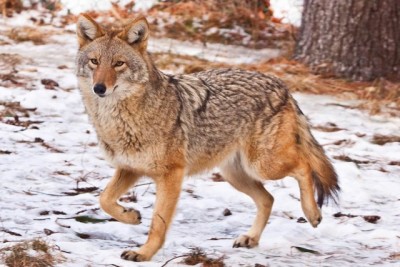
BY COLE WATSON
Oakville residents received a howling message from city staff during a Town meeting at St. Mildred’s-Lightbourn School that they will have to continue co-existing with wild coyotes.
The Jan. 20 meeting had been called because citizens are afraid that the population of coyotes is rising from frequent sightings and that the animals could pose a threat to families and pets.
“You have already been living with coyotes and you never even knew it,” said Julie Pietrus of the Toronto Wildlife Centre.
Pietrus gave a lengthy presentation on coyotes and their habits in hopes of educating the audience that the animals are not dangerous to the community but instead play a critical role in maintaining our ecosystem. Coyotes normally feed on small rodents and feral cats, which helps maintain bird populations.
Dissatisfied citizens wondered why can’t the animals be relocated.
“Because they are incredibly intelligent and nearly impossible to trap,” said Pietrus.
Even if the animals were trapped provincial legislation prohibits the relocation of wildlife more than one kilometer away from where it was caught.
Pietrus informed the approximate 70 attendees why coyotes may be near their homes and how they can deal with a confrontation in the rare chance one actually occurs. (See the infograph at the bottom for tips on how to deal with coyotes.)
Members of the Halton Regional Police department were also present to say that the coyote situation is out of their hands.
“We are a law enforcement agency not a wildlife management agency,” said Constable Marc Taraso. “Our role as police is to preserve the peace, enforce crimes and protect the public. Those are our main goals.”
Taraso informed the audience that officers don’t receive any wildlife training at all nor do they have the equipment to deal with any wildlife such as tranquilizers or nets.
“When a situation does arise our only dealings with wildlife is to dispatch an animal that’s been wounded in a car accident or to destroy an animal that has been deemed as dangerous, which will be done in cooperation with the Oakville & Milton Humane Society,” said Taraso.
Residents were allowed to ask questions to the guest speakers and expressed concern that there wasn’t enough resources dedicated to dealing with coyotes.
The town of Oakville has a coyote reporting system in place that citizens can access if they ever have a coyote sighting. The system features a map and risk assessment feature in order to inform the public of any conflict situations in the town.
To learn more about co-existing with coyotes visit www.projectcoyote.org or report a sighting at www.oakville.ca.

Comments
2 responses to “Oakville told to learn to live with coyotes”
Thank you Sheridan College for sharing this educational piece. @ John Waleski; you are welcome, thank you for going to the meeting to learn more about this issue.
Thanks Julia for clarifying our ability to live with the canines. You helped me rethink this compatibility. Also thank you Constable Tarasco for educating the public about your responsibility in this matter.